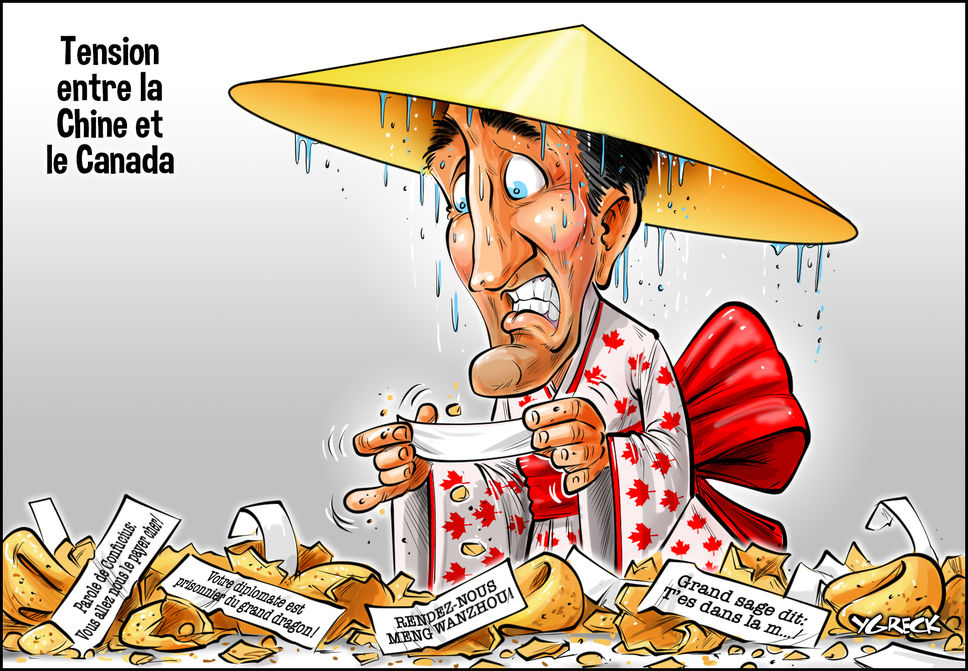Thirteen Canadians have been detained in China since the high-profile arrest of Huawei executive Meng Wanzhou in Vancouver on Dec. 1, Ottawa says.
Global Affairs Canada spokesman Guillaume Bérubé said in a statement to The Globe and Mail that the government is aware that 13 Canadians have been detained in China, excluding Hong Kong, since Dec. 1, 2018. Previously, only Michael Kovrig, Michael Spavor and Sarah McIver were publicly known to have been detained in China since Canada arrested Ms. Meng, chief financial officer of Huawei Technologies Co. Ltd. They were taken into custody after China promised retaliation for Ms. Meng’s arrest.
Mr. Bérubé said in the statement that at least eight of the 13 have been released. Global Affairs Canada did not disclose the identities of the other 10 Canadians.
The federal government has not linked any of the detentions with Ms. Meng’s arrest, although it has demanded the “immediate release” of Mr. Spavor and Mr. Kovrig.
Meanwhile, China’s prosecutor-general, Zhang Jun, said at a briefing in Beijing on Thursday that Mr. Kovrig and Mr. Spavor, who are accused of endangering national security, had “without a doubt” violated the law.
Ms. McIver, who was teaching English in China when she was detained in December, is among the eight who have been released. She has returned to Canada. Mr. Kovrig and Mr. Spavor are still being held.
The 13 people include Mr. Kovrig, Mr. Spavor and Ms. McIver, said a government official who was not authorized to discuss individual cases.
At any given time, Canadians all over the world get in trouble with the law and may be arrested.
The government official said a total of about 200 Canadians are in some form of legal proceedings in China for a variety of alleged infractions, and many are out on bail or probation. The source said the number of detained Canadians has remained relatively stable, without a marked increase or decrease in recent years.
For comparison, the source said almost 900 Canadians are detained in the United States.
News of the 13 Canadian detentions came as the United States issued a new travel advisory for China on Thursday, warning its citizens they could be detained without charge if they go there. Although the U.S. travel advisory does not directly mention the Canadian cases, it warns Americans could be targeted in a similar way.
“U.S. citizens may be detained without access to U.S. consular services or information about their alleged crime. U.S. citizens may be subjected to prolonged interrogations and extended detention for reasons related to ‘state security,’ ” the travel advisory said.
It is the first time the United States has updated its travel advisory for China since January, 2018. Canada has not updated its travel advice for China since diplomatic tensions between the two countries began to escalate. Mr. Bérubé said the government urges Canadians to exercise a high degree of caution when travelling in China, noting that it constantly reviews its travel advice for all countries.
The Conservatives are urging the government to issue a new travel warning for China in light of the detentions on Dec. 10 of Mr. Kovrig, an analyst for the non-profit organization International Crisis Group, and Mr. Spavor, who owns an organization that brings visitors to North Korea.
Tory foreign affairs critic Erin O’Toole said he is concerned China is also using “administrative harassment” of Canadians, such as Ms. McIver, as retaliation. He said he is hearing from parents who are anxious about adult children teaching in China.
“In one case, there was a mother speaking to me about her son who had seen some other Western-looking teachers picked up by authorities on the street. Now, I have no idea if those were Canadians, but this was a son telling his mother, ‘I’m a little concerned about what I see to be a bit more of a security interest in westerners,’ ” Mr. O’Toole said.
David Mulroney, a former Canadian ambassador to China, said detained Canadians will not get the same treatment they could expect at home.
“Foreigners who work in China notice this," he said. "It’s sending a chill through that broad community – diplomats, journalists, academics, [non-governmental organization] workers and business people – who try [to] understand and interpret China.”
> La suite sur The Globe and Mail.






















